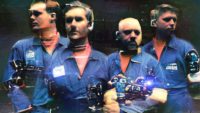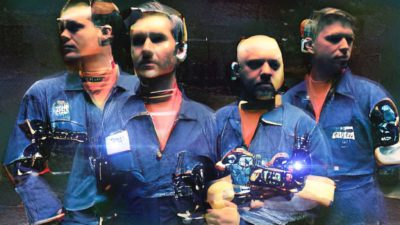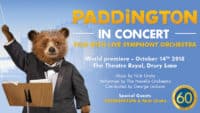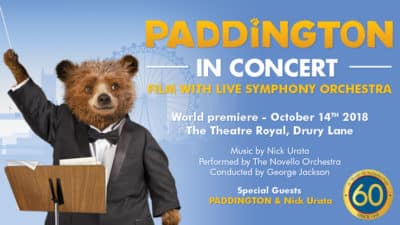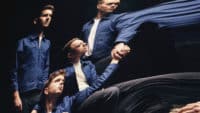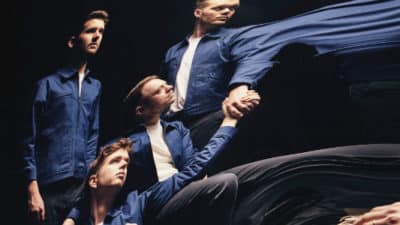Music
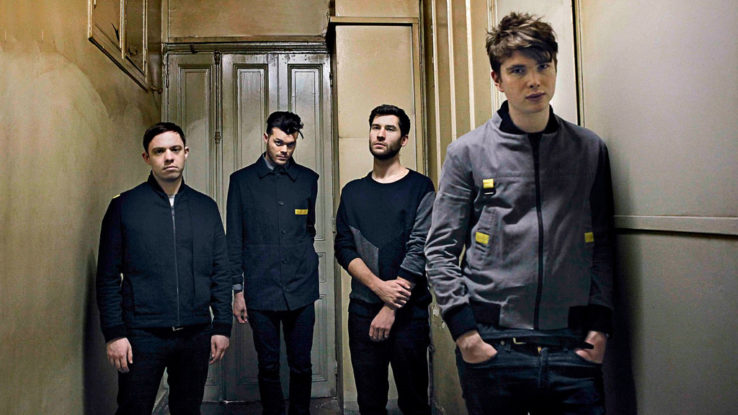
Ticketmaster meets Everything Everything
Everything Everything haven’t stopped since they dropped their second album Arc back in January. With the album entering the charts at #5, demand for the Manchester band has been high, and they’ve been on the road ever since.
Nearly a year on, the band’s front-man Jon Higgs took some time out before their show at The Institute in Birmingham, to tell us about life on the road, working in the studio with Dave Kosten and what chart success actually means to the band.
Hi Jon, how’s the tour going?
It’s been going really well. We really enjoyed Ireland – we don’t get to go out there very often. Dublin was absolutely ridiculous and it was the last time too, so that’s been a real highlight. But also the Manchester shows were just incredible .
We played two nights at The Ritz, which I still can’t believe we actually filled. I used to live just opposite it a couple of years ago and even then, despite having the band and everything, I never thought we were going to sell-out two nights at The Ritz. So I couldn’t really believe it.
You’re closing the tour with two shows at The Forum in London – anything special planned?
We’ve got some ideas on the go for the final two shows, but we’re just trying to keep all of these shows as high quality as we can – so we’re just taking it day-by-day.
You’ve pretty much toured throughout 2013, how have you found it as a band?
It’s not without its stresses. It’s difficult for those that are left at home and you’ve got to strike a balance between your work and personal life. It can get fraught at times, because you see the same people every day.
You’ve really got to get on, otherwise it will just go absolutely awful. We’re pretty lucky in that we do really get along – we’ve got a great crew surrounding us that are made for the road. They really know how to make it work and it’s been working great.
You’ve brought fellow Manchester band Dutch Uncles on tour with you – do you still feel connected to the Manchester scene?
Yeah, certainly we feel connected to those guys. The Manchester scene… we’ve moved out of the new band scene, so I couldn’t tell you what this year’s new Manchester bands are. I guess that’s their thing now and we’re probably old timers to them.
But certainly I feel very connected to the crowd of bands that appeared when we did – like Delphic, Dutch Uncles and Egyptian Hip Hop. We’re good friends with Dutch Uncles. We think our music sounds similar and we’ve got similar influences, and just enjoying hanging out.
We saw you both at Festival No.6, what’s been your favourite festival this year?
Really enjoyed playing Australia. We’d never been there before and it was just a completely different world – as you can imagine. The fact that someone would take us there just to play our songs thousands of miles away, and people would know the songs when we got there was amazing.
You released Arc in January, so it’s nearly been a year since it came out – how do you feel about the album now? Are you more comfortable with it?
Certainly. A lot of it has come to life over the year. People have got to know it and the live show has sort of changed to incorporate these new songs.
The songs resonate live in different ways to how they do on the record, because we had never played some of them live before. Songs like ‘Duet’ have become big favourites now in live sets, and it’s interesting just to see how your relationship with the songs changes.
So how have you found incorporating the new album into your live show?
It’s nice, to be honest. I think the albums are quite different really and we find that a lot of the Man Alive stuff works really well up close to the Arc stuff, so we try not to put it into sections.
We just have a theory that you shouldn’t play any more than a few slow ones or quiet ones; if you’re going to play a hard song then you’ve got to try and sooth everyone’s brow afterwards with a softer one, and so on.
Weighting the set becomes quite a big topic of conversation and it changes throughout the tour. But it’s really nice to have all these songs to pull from now. When we only had one album we were pretty restricted in what we could play.
How did the experience of writing and recording Arc compare to when you worked on you debut album, Man Alive?
We found it a lot easier. We were much more confident about ourselves the second time around and we didn’t have so many worries, because we’d done all of our worrying the first time and it worked out really well.
So we thought let’s do what we want and stop worrying about it, and we found it much, much easier. We find a lot of people come to us and say ‘what about the second album trouble?’ and we’re like that’s not really happened for us.
We found it much easier in fact – a little too easy perhaps. We’re going to try and make it a bit harder for ourselves the third time.
Have you got anything in the works for a third album yet?
Yeah, we’ve got two or three demos that are in their infancy. It’s quite difficult to write on the road, and we’ve been entirely on the road. It’s quite hard to find the time and head space to do it.
What direction are you taking it?
Every time we do anything it’s completely different. So I couldn’t even tell you. The demos we’ve already got are all wildly different to each other – so God knows.
Arc was a more direct and accessible record – was that an intentional move?
Yeah, definitely. Lyrically, I wanted to be more understandable and we wanted less distraction from the good bits of music. We thought on Man Alive we had good bits here and there, but we just filled it up with loads of slightly unnecessary stuff.
I kind of got to thinking why are we doing this? We’ve got a song in this – we don’t need to go here and there. So third time around, I don’t know yet. We’ve learnt a lot from making both records. I don’t think it will be any less direct than Arc, but I think there will be a lot more energy in it.
Will you be working with Dave Kosten again?
I don’t really know. We’re still just talking about things at the moment. We’re not really at that stage yet. We need to get songs written and demos made, and then we’ll start thinking about who we work with it.
How have you worked with Dave in the past?
He’s very good at finding the nuggets; the core of the song; the bits that are good. Sometimes we’ll come to him with a song and it might have five sections in it, and he’ll say the second section is clearly the best bit – so keep repeating that.
He’s got a good head for catchy hooks and things like that. He’s also very good at managing us and getting things done on time.
You’ve had chart success with both of your albums – is that important to you, or does it just feel like an arbitrary number?
It’s important to us. It’s certainly important to people like our label and people around the world – if you wanna get booked in France and the promoters see that your record went in at #5 you’ve got a much higher chance.
There’s only a few ways to measure success and the charts is one of the best ways. So to get a Top 5 album means a great deal for other people in the music industry. And therefore to us, because these things matter – if we didn’t make the Top 40 it’s quite likely we’d be in a very different place.
It’s just a number; it is only there for a week and then you slide down the charts, but it does make a huge difference these days.
Do you think Man Alive being nominated for the Mercury Prize had a big impact?
I think it did. It certainly pricked up ears all around Europe and further afield. And so did the BBC Sound of 2010 list that we were on – we still get asked about that now. It seems to be a really big deal – particularly in Europe.
What do you think about this year’s nominations?
It’s a good list, compared to recent times. It would be nice if one of the electronic acts – Rudimental, Disclosure, Jon Hopkins – won, if just for a change. But I’d be happy for someone like Laura Marling to win it.
So do you think electronic acts are overtaking guitar bands then?
I think any kind of speculation about instruments used in music is total bollocks, to be honest. I don’t think there’s any more or any less guitar bands now then there was 50 years ago.
I’m so tired of it. I think it’s just something to talk about. Bands use synths, and they use guitars, and they use drum kits and people want to talk about a wave coming and going – and it doesn’t happen any more. Last time it happened was maybe Brit Pop, but even then the actual nuts and bolts of it are interchangeable with now.
So what are you guys up to after your UK tour finishes?
As soon as we walk off stage in London we head off to France to start a European tour with Foals.




